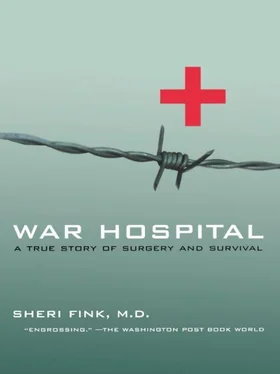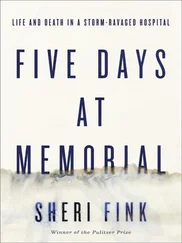Ejub drops the razor into a beaker full of hydrogen peroxide. Used in the production of rockets and torpedoes, paper, chemicals, and car batteries, here in the operating room it serves as a sterilizer. Some townspeople found a cache of the liquid treasure at the abandoned battery factory up the road. Others diluted it with water purified in fifty-liter vats used, in better times, for distilling plum brandy. War is full of such small, absurd ironies. A 3 percent solution oxidizes bacteria to death without harming human tissue. If Ejub didn’t have it, he’d be stuck in American Civil War–like conditions. One out of three amputation patients used to die from infection or blood loss. Sterile technique, shown to prevent infection by Joseph Lister in 1865, catapulted survival rates and stood as one of two great surgical advances of the century. Ejub calls hydrogen peroxide “Bosnia’s greatest war hero.” Little jokes like this keep him going.
At the moment, Ejub isn’t smiling. The ability to sterilize equipment and apply an antiseptic puts him only one foot into the nineteenth century. The century’s other great discovery—general anesthesia—is not something Ejub has to offer his patients. All he has are two syringes of precious local anesthetic swiped from the town’s abandoned dental clinic. They lie in a silver pan before him. Ejub knows how to use the anesthetic to numb the skin, but not to prevent pain in deep structures such as bone. When he thinks of the fact that the injured foot connects to a conscious human being, he wonders whether it would be better, in some cosmic sense, not to operate. Not long ago, when faced with his first amputation, he felt so powerless that he prayed to God for the suffering patient to die before he began. And—regardless of the fact that he’s trapped in what some people are calling a “religious” war—Ejub does not even believe in God.
To counter his paralysis, Ejub steers his mind away from the patient and toward the wound. He forces himself to sit down beside the low-standing cot and take up his instruments: a pair of pincer-like forceps in one hand, for gripping skin, and a scalpel in the other. He holds the blade like a pencil and inscribes a semicircle in the skin of the swollen, dusky lower leg. This is his first mistake.
The patient, knee propped up on a folded blanket, remains still, silent. Ejub stares at the leg as he works, face impassive, deepening the incision, bowing flesh with his scalpel as if playing a violin. The world has constricted to the leg, the leg and the job he has to do, like a piece of wood he needs to whittle into shape.
He has no assistant to expose tissue according to the display he needs, or to scan for blood vessels and, fingers dancing a delicate ballet with his, tie them off in silence. Instead, he has the help of an older pediatrician who is even less adept at surgery, the recently appointed director of the war hospital, Dr. Avdo Hasanović. The bulbous-nosed doctor seats himself on a stool across from Ejub, takes up the other of Srebrenica’s only two scalpels, and begins to stab at the patient’s calf as the nurse struggles to hold it steady.
The two doctors work separately, trying to complete the surgery more quickly and thus minimize pain and the dangerous blood loss that could lead to shock and death. The patient has already bled a great deal from his wound, and, with no blood bags and no electricity to run a refrigerator for transfusion products, they cannot give him a transfusion.
The patient groans—just once. He has barely flinched or bled, and Ejub has overlooked what this means: He is cutting dead tissue. Fragments of the exploding mine have seared the patient’s blood vessels, starving the lower leg of vital blood supply. If the doctors complete the amputation here, gangrene and infection will creep up and ultimately kill the young man.
Ejub scrutinizes the leg.
“A little higher,” he pronounces and points to a spot. He looks to the older doctor, who nods his agreement.
Starting at this point, Ejub slides his knife down, splitting the skin just as the nurse slit open the pant leg. The flesh drops to either side as he cuts.
After some poking and probing, the other physician picks up the task and begins to slice upward. The nurse can barely keep up with him, untying and retying the rubber catheter being used as a tourniquet, higher and higher, swabbing with disinfectant, injecting with anesthetic, her escaped curl of hair nearly brushing the patient’s bloated skin, her bare fingers flirting with the scalpel.
Now the skin incision has been extended to its new, higher position. The two doctors resume cutting toward bone. Each stroke of their scalpels takes them deeper, away from numbed skin and tiny capillaries and closer to large nerves and arteries. A loud “Ohhhh!” escapes the patient.
The doctors intensify their work. Ejub’s scalpel nears the anterior tibial artery. Its caliber measures approximately a quarter of an inch and it contains blood pressurized by every pulse of the heart to roughly 120 mm of mercury or two pounds per square inch. Normally, surgeons defuse the vessel, gently lifting it away from the surrounding tissue and tying it in two places with lengths of absorbable, string-like suture. Only then do they cut it.
But Ejub, rushing, has little suture or experience. He slices through the artery.
The doctors fumble to stop the bleeding with the rubber tourniquet, retying it tightly around the patient’s leg, hoping that the external pressure will overwhelm the blood vessel’s internal pressure, giving the blood in the vessel time to clot. To compound the force, Ejub grips the leg tightly between his hands.
The patient moans.
The other doctor presses down on the patient’s knee with his left hand to steady it, forceps dangling from his fingers. With his right hand he saws and saws with his scalpel. The edge of the blade slices through a dense network of nerve endings in the membrane around the bone, the periosteum. The patient yells.
Ejub presses his fingers hard against the skin to close off the broken artery. For now he blocks out his emotions and tries to focus, but the shutter of his mind snaps and his brain can’t help being exposed to the horror. Still, he reaches for the zhaga , a “p”-shaped saw designed for cutting metal, not bone. The man with the camera stops recording the operation. Soon the worst part is over and somehow the young patient survives. The operation is done, and all Ejub wants is a cigarette.
The doctor peels off his gloves, pulls off his gown, and doffs his blue cap. He walks out of the operating room and down the dark hallway, pushes open a wooden door, enters a vestibule, and exits the hospital through its back door. He walks down its steep driveway and turns left onto the main street.
Hills lurch up around him, casting evening shadows on the road. He strides uphill, past old homes that once had terra-cotta tile roofs. Shrapnel marks splatter some façades; others are destroyed, skins burned off, just skeleton masonry remaining. Brick chimneys trace jagged silhouettes against the sky. The roofless hulks are like open dollhouses. He knows the people who lived in these houses, can recite them by name as he walks up the street—Begić, Delić, Fazlić…
A child of the mountainous villages just south of Srebrenica, Ejub has never liked living in a valley. Even when he first arrived in Srebrenica to work as a doctor six years ago, six years before the war, he felt trapped.
Now men sow the hills with mines instead of corn, wheat, oat, and tobacco seeds. They drop explosive-filled shells into mortars and let them fly. Every missile that comes whizzing out of these hills, bursting into hot metal fragments, reminds him of his vulnerability. His body, too, can be pierced like Swiss cheese. And who would take care of his wounds?
Читать дальше












